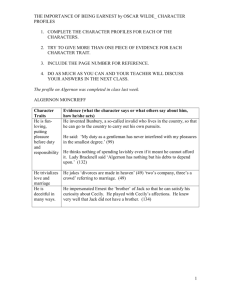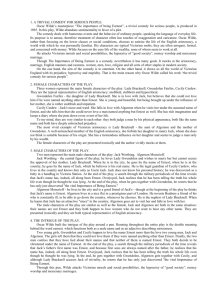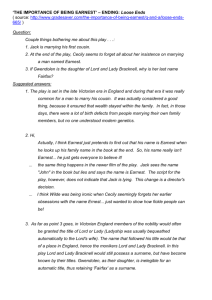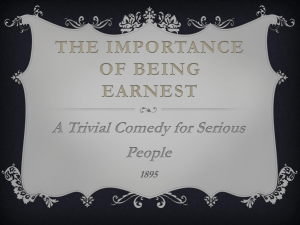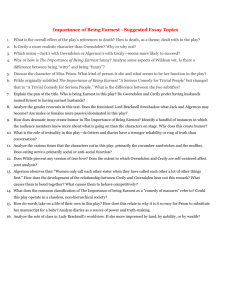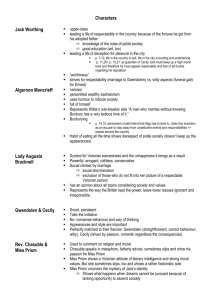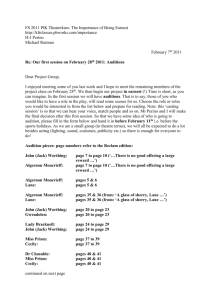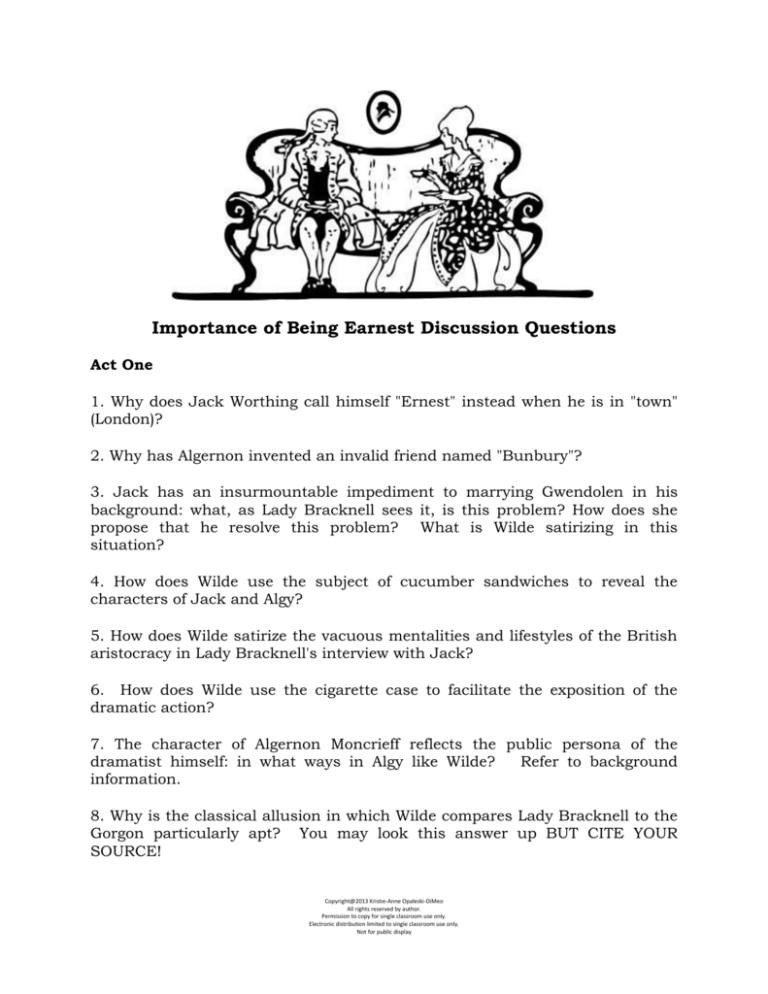
Importance of Being Earnest Discussion Questions
Act One
1. Why does Jack Worthing call himself "Ernest" instead when he is in "town"
(London)?
2. Why has Algernon invented an invalid friend named "Bunbury"?
3. Jack has an insurmountable impediment to marrying Gwendolen in his
background: what, as Lady Bracknell sees it, is this problem? How does she
propose that he resolve this problem? What is Wilde satirizing in this
situation?
4. How does Wilde use the subject of cucumber sandwiches to reveal the
characters of Jack and Algy?
5. How does Wilde satirize the vacuous mentalities and lifestyles of the British
aristocracy in Lady Bracknell's interview with Jack?
6. How does Wilde use the cigarette case to facilitate the exposition of the
dramatic action?
7. The character of Algernon Moncrieff reflects the public persona of the
dramatist himself: in what ways in Algy like Wilde?
Refer to background
information.
8. Why is the classical allusion in which Wilde compares Lady Bracknell to the
Gorgon particularly apt? You may look this answer up BUT CITE YOUR
SOURCE!
Copyright@2013 Kristie-Anne Opaleski-DiMeo
All rights reserved by author.
Permission to copy for single classroom use only.
Electronic distribution limited to single classroom use only.
Not for public display
9. The other classical allusion, to the Emperor Augustus, is more oblique: why
did Wilde choose the name "Augusta" for Lady Bracknell? You may look this
answer up BUT CITE YOUR SOURCE!
10. What is the essence of such Wildean aphorisms as the following?" "[Women
flirting with their own husbands] looks so bad. It is simply washing one's clean
linen in public."
11. What point is Wilde making about journalism in general and reviewers in
particular when Algernon remarks, "You should leave that [literary criticism] to
people who haven't been at University. They do it so well in the daily papers"?
12. What tools of satire –irony, juxtaposition, understatement, paradox –are
apparent in this opening act? CITE SPECIFIC LINES FROM THE PLAY.
Act Two
1. "Gwendolen and Cecily are not so much opposites as complements." Explain
this remark by reference to their speeches and actions.
2. Early on in Act One Jack Worthing articulates the difference between city life
and country life. Show three ways in which the life of the country (as
exemplified by the Manor House, Woolton, Herfordshire) is very different from
the bachelor life of The Albany, London.
3. Like Jack, Algy leads a double life, utilizing an escape mechanism when
necessary to free himself of a life of social obligation and lead a life of
unrestrained pleasure. Explain their differing motivations, but how both are
"confirmed Bunburyists," nevertheless.
4. The comedy of mistaken identity is a very old dramatic form – as old, in fact,
as comedy itself – which Wilde manages to revitalize in The Importance of Being
Earnest. The key mistaken identity in this play, of course, is that of “Ernest”
himself. What comic consequences result from Algernon’s assuming the role of
Ernest Worthing?
5. In what ways would the terms "hedonist," "aesthete," and "gourmand" be
suitable descriptors for Algernon? You may look this answer up BUT CITE
YOUR SOURCE!
6. How would you characterize Canon Chasuble and his relationship with Miss
Prism? Why does Wilde include them at this point in the play?
7. Give five examples of Wilde’s wit, comedy and/or satire in this act. How
does this further his satirical purpose?
Copyright@2013 Kristie-Anne Opaleski-DiMeo
All rights reserved by author.
Permission to copy for single classroom use only.
Electronic distribution limited to single classroom use only.
Not for public display
8. A subtle sub-theme of the play is readers, publishers, fiction, and
censorship. What points by implication is Wilde making about contemporary
literature?
9. What role does food have within the play? (Notice how Jack and Algy are
eating muffins at key points – and then those pesky cucumber sandwiches in
Act I…)
10. Based on the types of comedy discussed, how would you define The
Importance of Being Earnest thus far? Defend your selections using textual
references.
Act Three
1. Lady Bracknell has been described as "the perfect embodiment of the
attitudes and rules of conduct of the British aristocracy." How does Wilde
unmask the mercenary motives of Lady Bracknell to reveal her essential
snobbishness and hypocrisy in the final act?
2. To a certain extent, Miss Prism and Dr. Chasuble are also satirical figures
through whom Wilde attacks British institutions, namely education and the
Church of England. Explain briefly what aspects of these institutions Wilde is
satirizing.
3. Define the term "bunburying," and explain its significance in the play. How
does bunburying relate to Wilde's critique of Victorian earnestness? How are
even Cecily and Dr. Chasuble "bunburyists"?
4. The play has a number of objects that acquire additional meanings as the
action develops. Explain how three of the following symbols in The Importance
of Being Earnest relate to the plot and especially to the characters: cucumber
sandwiches, bread-and-butter, the German language, French music and
language, bottles of champagne, teacake, muffins, and the capacious handbag.
5. "Although we see little of them, each of the butlers has a back story and
serves as a vehicle for Wilde’s satire of the aristocracy." Explain.
6. If the principal characters will go to any lengths to avoid their
responsibilities and place self- interest at the top of their own agendas, then a
resolution of the conflicts in the play would be impossible: somebody has to
make concessions. How does the resolution scene in the third act resolve the
conflicts between Lady Bracknell and Jack? Jack and Algernon? Gwendolen
and Cecily?
Copyright@2013 Kristie-Anne Opaleski-DiMeo
All rights reserved by author.
Permission to copy for single classroom use only.
Electronic distribution limited to single classroom use only.
Not for public display
“Importance of Being Earnest” Study Guide 1 KEY
1.
Jack Worthing calls himself “Ernest” instead when he is in London because
his “brother” that he came up with is full of mischief and misbehavior, so
Jack is able to escape to London and misbehave on account of his brother.
This itself creates a morality for Jack while in town as he supposedly helps
his brother out of his troubles. This is ironic, and the life of Ernest was
disapproved in Victorian Society while what Jack appeared as was normal
and looked upon greatly. Jack strived for a “very high moral tone.”
2.
Miss Fairfax was referred to as “The Honourable Gwendolen Fairfax”
because it is an honorary name designated from her father’s title, but this
was just a designation, so they never used it in informal situations such as
direct address or bills.
3.
Algernon invented an invalid friend name “Bunbury” because it was his way
of coping and escaping with his social obligations in reality.
4.
Lady Brackwell sees that the problem between Jack and Gwendolen
marrying is the fact that he did not have a close family to raise him. She
feels if he establishes a family and creates a relationship with them, he can
resolve the problem. This is satirizing the lack of mobility in the transition
between social classes in the Victorian Era.
5.
Wilde uses the subject of cucumber sandwiches to reveal the characters of
Algy and Jack by showing the selfish, witty character of Algy by him taking
some of the cucumbers because “he is her nephew”, and Jack contrastingly
a respectable and kind young man.
Copyright@2013 Kristie-Anne Opaleski-DiMeo
All rights reserved by author.
Permission to copy for single classroom use only.
Electronic distribution limited to single classroom use only.
Not for public display
6.
Wilde satirizes the vacuous mentalities and lifestyles of the British
aristocracy in Lady Bracknell's interview with Jack through her valuing of
ignorance, as she puts it, ignorance is a “delicate exotic fruit” (Pg 12).
7.
Wilde uses the cigarette case to facilitate the exposition of the dramatic
action because it creates the suspicion in Algy’s mind that Jack has a
double life.
8.
Algy is like Wilde in that they are both aesthetics, and Wilde exemplifies the
fact that Algy has no moral convictions and lives in a beautiful way.
9.
The classical allusion comparing Lady Bracknell to the Gorgon is
particularly apt because the Gorgon was a Greek mythological creature that
was a terrifying female, just as Bracknell is in her crude and domineering
character.
(www.arthistory.sbc.edu/.../papers/kottkegorgon/gorgons.html).
10.
Wilde chose the name “Augusta” for Lady Bracknell because in alluding to
Emperor Augustus, he is intending how the wealth and distinguished
lifestyle came from inheritance, and her ignorance and crude personality
was not something she earned, but rather gained out of luck.
(http://www.roman-empire.net/emperors/augustus-index.html)
11.
It is appropriate that Lady Bracknell ring the doorbell in a “Wagerian
manner” because it is a long, held out ring, and it is able to tell them it is a
relative (or creditor) at the door, so the servant not answer.
12.
All of those places, Tunbridge Wells, Shropshire, etc. all reveal that the
characters are wealthy and revolve their lives around the social class they
belong too.
Copyright@2013 Kristie-Anne Opaleski-DiMeo
All rights reserved by author.
Permission to copy for single classroom use only.
Electronic distribution limited to single classroom use only.
Not for public display
13.
The meaning of such Wildean aphorism is Wilde’s way of questioning and
outrageously opposing actions of society especially those in the Victorian
Era. He uses a metaphor to criticize people’s behavior and lives in public.
14.
Wilde is expressing the social class separation through this, because he is
showing how the two wealthy guys snobbishly talk down about journalism
as a whole, and sarcastically says how the uneducated should be the ones
in control of criticizing literature.
15.
Wilde is showing how people in society, such as Jack were ignorant to the
affects their wealth and power had on those below them. They followed the
“Liberal Unionist” views, where Irish would be sent deeper and deeper into
poverty. Wilde’s radical ideas challenged this and showed how ignorant and
blind the wealthy truly were, because he himself was a libertarian.
(http://www.merriam-webster.com/dictionary/liberal%2Bunionist)
Act II Study Guide KEY
1.)
"Gwendolen and Cecily are not so much opposites as complements" comes
from the fact that both of them are fooled yet intrigued by the character of
Earnest. They both see him in “opposite” ways, yet to both of them is a
great fascination.
2.)
The country life differs from the London life. The London life is described
and made out to be lavish, fashionable and cultural, a haven for Jack to
escape the prison of life to. On the contrary, the country lifestyle is
unspoiled and almost a representation of the life in Victorian times. The
Manor House, Woolton, Hertshire is an escape from the extravagant city life,
where nature is emphasized. “The garden, an old-fashioned one, full of
roses.” contrasts the modern lifestyle to the city of London. It expresses an
escape and less modern lifestyle such as in the city. With the less literal
imagery, thee plot is set up and they say “Time of year, July.” While the
Copyright@2013 Kristie-Anne Opaleski-DiMeo
All rights reserved by author.
Permission to copy for single classroom use only.
Electronic distribution limited to single classroom use only.
Not for public display
countryside is not always summertime, the plot taking place in the warm,
peaceful, summer contrasts with the cold, chaotic atmosphere of the city.
3.)
The differing motivations of Jack and Algy with their double life is based on
their escape from reality. For Jack, we see it more as a rebellion and more
enjoyable life, because he goes and gallivants in the city, enjoying the high
life. For Algy, it ia more of a mechanism to get him out of situations, to
avoid any displeasure society might deal him. Both are Bunburyists
however because they both need an escape from the reality and harshness
of the Victorian Society.
4.)
The comic consequences of Algy assuming the role of Ernest Worthing is the
fact that he will expose lie that Jack has created through the truth and
reality.
5.)
These terms are suitable for descriptors of Algy because he and his views in
society, such as art, demoralizing state of marriage, etc. all oppose those
views and lifestyles held in high esteem during the Victorian period.
6.)
Canon Chasuble is a character that comes off as very intelligent, country
reverend who is very literate. He and Miss Prism have romantic feelings for
each other. This is in this part of the story because the walk they go for acts
as a distraction for when Algeron comes as Ernest and only Cecily sees him.
7.)
–“Chasuble: That is strange. Were I fortunate enough to be Miss Prism's
pupil, I would hang upon her lips. [Miss Prism glares.] I spoke
metaphorically.--My metaphor was drawn from bees. Ahem! Mr. Worthing, I
suppose, has not returned from town yet?”
-“Miss Prism: Cecily! I am surprised at you. Mr. Worthing has many
troubles in his life. Idle merriment and triviality would be out of place
in his conversation. You must remember his constant anxiety about
that unfortunate young man his brother.”
-“Cecily: I keep a diary in order to enter the wonderful secrets of my life. If I
didn't write them down, I should probably forget all about them.”
-“Algernon: That is a great disappointment. I am obliged to go up by the first
train on Monday morning. I have a business appointment that I am anxious
. . . to miss?”
Copyright@2013 Kristie-Anne Opaleski-DiMeo
All rights reserved by author.
Permission to copy for single classroom use only.
Electronic distribution limited to single classroom use only.
Not for public display
-“Algernon: Oh, well! The accounts I have received of Australia and the next
world, are not particularly encouraging. This world is good enough for me,
cousin Cecily.”
All of these examples use either irony, wit, or simple comedy that further the
satirical criticizing of the desire for that higher status, and separation from
the Victorian Society.
8.)
Wilde is saying how the society itself is controlling and restricting the free
and endless features those who create fiction can write. The Victorian
society upholds many views and that is all the literature was written after.
He uses Cecily and her diary to show how her true thoughts and beliefs or
“secrets” are just that. She keeps it away from others and does not share, it
is her double life.
9.)
Food played a role to symbolize and highlight the lack of proper manners
they have. This gives part of the reason to why they have double lives and
why they have a problem fitting into society.
10.)
“The Importance of Being Earnest” thus far has subtle, high understanding
comedy, between sarcasm, irony, and satire. The book as a whole though
pulls together all of the aspects of comedy for the obvious criticizing of the
Victorian Society. “Cecily: I keep a diary in order to enter the wonderful
secrets of my life. If I didn't write them down, I should probably forget all
about them.” This, out of many different parts is showing how not just the
two main characters have double lives, but the more subtle characters
(common people) such as Cecily have one, and this is satirical in the
suppression of the freedom in literature during that time.
Act III Guide KEY
“Importance of Being Earnest” Study Guide 3
1.)
We see the character of Lady Bracknell in a way that she represents the
British aristocracy. Wilde expresses her snobbishness and hypocrisy when
Jack refuses Cecily and Algy to marry if Bracknell does not let him marry
Gwendolen. Lady Bracknell refuses, showing her standing by and
embracing the rules of the British aristocracy.
Copyright@2013 Kristie-Anne Opaleski-DiMeo
All rights reserved by author.
Permission to copy for single classroom use only.
Electronic distribution limited to single classroom use only.
Not for public display
2.)
Through Miss Prism and Dr. Chasuble’s quick and premature love, Wilde is
showing that those who are in charge and lead the educational and religious
institutions are ignorant and not how we perceive them.
3.)
Bunburying is the act of Algernon escaping to aid a fictitious ill friend. This
is Algernon’s escape from society. This shows how people’s inner character
and true desires are restricted fro the Victorian society, because they were
set in their ways, with no freedom of mind for the citizens. Cecily is a
bunburyist because her freedom of mind is expressed through her secret
diary, and Dr. Chasuble has secret romantic feelings that are suppressed for
the most part.
4.)
The cucumber sandwiches play a large role in developing the characters of
Algernon and jack. For Algernon, it shows his ignorant and rude character,
but expresses Jack’s contrasting character to this. Altogether though, the
lack of manners between the men in their actions shows their lack of fitting
into society.
When Cecily offers cake to Gwendolen, she replies saying, “Cake is rarely
seen at the best houses nowadays.” This shows how they believe they are
above everyone else, because of wealth, and they try to fit into that class of
society. It shows the class of the characters and the characteristics that
come about because of it.
Lady Bracknell states, “French songs I cannot possibly allow.” She ands her
statement with how German is much more respectable. The suppression
and hatred of French music and language was a reflection of the English’s
fear of French influence after the French revolution. Wilde writes about the
French with negative connotation.
5.)
Wilde shows that Gwendolen and Lady Bracknell are similar in the claims
from Jack and Algy describing Gwendolen as a clever, fashionable, self
confident, and an experienced woman. This is similar to that of Lady
Bracknell and how she is pompous and mature/strict in her ways while also
expressing her high class. We see the first few lines that Gwendolen speaks,
“I am always smart!” and “In fact, I am never wrong.” This shows the same
pompousness that Bracknell has. They do vary though, because Gwendolen
Copyright@2013 Kristie-Anne Opaleski-DiMeo
All rights reserved by author.
Permission to copy for single classroom use only.
Electronic distribution limited to single classroom use only.
Not for public display
is young and still has her freedom of mind, unlike Bracknell who has her set
ways close to that of the society.
6.)
The cigarette case and handbag represent plot secrets, because both of them
contain a secret that ultimately develop into a shocking truth which reveal
something about the characters. The first plot secret is when Algernon
returns Jack’s cigarette case. This ultimately unravels the truth, because
with this suspicion and truth, Algernon eventually unveils the truth about
Jack’s Ernest. With the handbag, we find out in the beginning that Jack
was adopted when he was found in a handbag. When this plot secret
develops, we find out the handbag of Miss Prism was the one he was from,
making Miss Prism his “mother”, but ultimately finding out his mother was
Bracknell’s poor sister.
7.)
The butlers represent the common person under the British aristocracy,
who are not rich and they are controlled completely in their ways. They lack
freedom, yet act as a filter and control valve to Jack and Algy’s wild ways.
8.)
Lady Bracknell’s largest characteristic is her pretentious and arrogant and
evil attitude. The allusion to Gorgon truly represents how she is deep down,
especially in the way we see her treat Jack. Egeria illuminates the function
of her role in her relationship with Chasuble. Their relationship shows how
it is down the path of a common relationship because of her allusion to
Egeria, who was an advisor, just as the women at that time were advisors to
their lover.
9.)
Between Lady Bracknell and Jack, he finally found out his family, which
was truly the only thing standing between him getting married.
Between Jack and Algernon, Jack forgives Algy for faking his earnest and
letting the truth come out, because Jack learned and has become sincere
through Earnest.
Between Gwendolyn and Cecily, they both find their true Earnests,
because for Cecily it was Algy who pretended to be Ernest, and for
Gwendolyn, the person she desired was front of her all along.
10.)
For Jack, his desire to live happily and free came by his extravagant escapes
in London, which led him to fall for Gwendolyn. The only thing standing
Copyright@2013 Kristie-Anne Opaleski-DiMeo
All rights reserved by author.
Permission to copy for single classroom use only.
Electronic distribution limited to single classroom use only.
Not for public display
between Gwendolyn and him was Bracknell’s opinion of him. In the end,
through the truth coming out, he found he had a family and he was able to
marry Gwendolyn. For Cecily, it was her desire for Ernest and finally
meeting him. The chance that even though he was not real, she still
ultimately ended up in love with Algernon who was basically him in her
mind. Lastly, Gwendolyn desires to have Ernest in her life. She runs into
the chance that Jack was actually Ernest. This however unveiled Jack’s
true character and enhanced him to become more sincere and all. This
chance fulfilled her because she did not lose “Ernest” because Jack lives
through him from the lessons he’s learned.
Copyright@2013 Kristie-Anne Opaleski-DiMeo
All rights reserved by author.
Permission to copy for single classroom use only.
Electronic distribution limited to single classroom use only.
Not for public display

